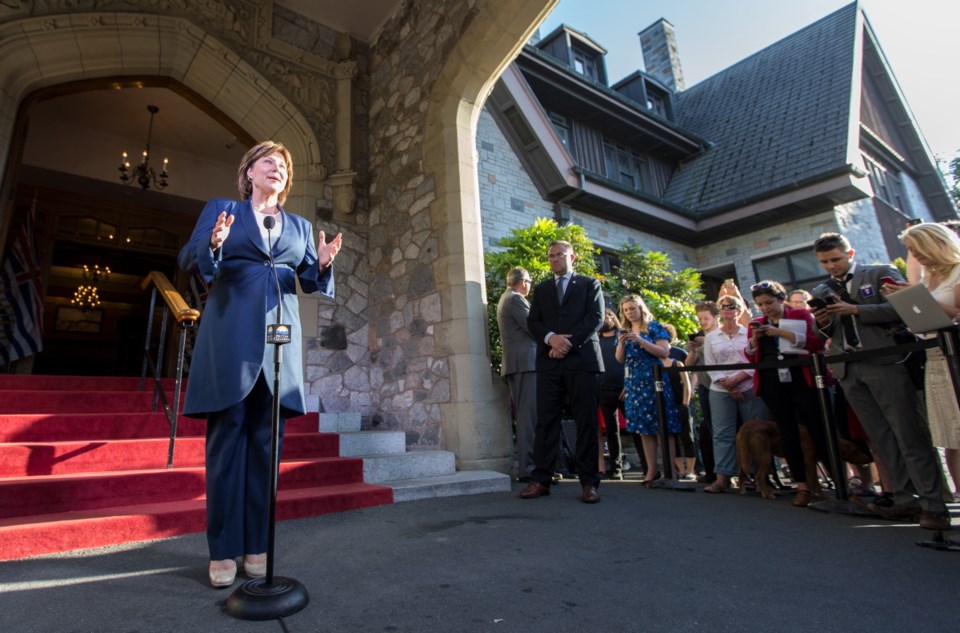Premier Christy Clark had a demanding role to play over the last several weeks. She had to portray a scrappy, determined leader fighting a losing battle, then pivot to losing gracefully with honour.
She nailed the first part, until she started overplaying it. But she missed most of her marks on the second.
Just before 9 p.m. in the dusky Rose Garden outside her office, after her fate had been sealed by Lt.-Gov. Judith Guichon, she saw a small gaggle of reporters and knew something was required of her. So she made a brief appearance to offer sincere congratulations to NDP Leader John Horgan and Green Party Leader Andrew Weaver. It was the first graceful move she’s made in weeks.
She’d just been challenged in unprecedented fashion by the lieutenant-governor on the dicey position she’d taken a day earlier. She’d served notice that she would go to Government House after losing the confidence vote and inform the LG, but not offer any advice on what to do about it. Then, “if asked,” she would observe that an election was the only way out of this mess. That would have allowed her to avoid handing over power to the NDP, and not take responsibility for an election that she herself has said no one wants.
It put the lieutenant-governor in the bind of having to either ignore the NDP-Green majority in the house, by calling an election, or ignore her first minister’s game-playing.
Clark herself confirmed in the Rose Garden that Guichon put an end to the game. “When it became clear that I needed to ask for dissolution, which she made very clear, that I only had two choices, I did ask for dissolution. … She’s chosen a different path.”
Clark’s (impending) resignation was on the table by then as well, so it was accepted. That’s likely why she looked a bit shaky coming out of Government House. She’d just had her alibi pulled out from under her.
That little manoeuvre was preceded by the absurd introduction of two bills designed to lure the Greens away from a pact they’d signed with the NDP just three weeks earlier. One gave the Greens party status, but was dropped without them knowing anything about it. Like that would ever work.
The other was 29 pages of campaign finance reform ideas cribbed almost word for word from the NDP and Green campaign platforms, all of which has been ignored by the cash-hungry Liberals for years.
Not only that, they wanted passage in one day of a bill that needed weeks of study, in order to get them full credit before the end drew near. When she lost both votes, she blamed the Greens and NDP for failing to co-operate.
Then there was the tricky little stunt where the Liberals asked their Speaker, in the chair for three days and still struggling with the riding names, to deliver a lofty opinion on the workability of the house under any new arrangements the NDP and Greens might try. He offered a vague outline that achieved nothing.
Earlier, there was the ridiculous throne speech, a wholesale capitulation to the NDP and Greens, in which pages and pages of platform ideas were lifted and made brand-new Liberal values, despite the fact Liberals had fought, ignored and belittled some of them for years.
There was a moment after the signing of the Green-NDP pact, when hopes for a Liberal government disappeared in all but her mind, that Clark made a dignified decision.
While the NDP and Greens were prematurely agitating for a handover of power without even a legislative session, she stepped up May 29 and acknowledged a transfer of power looked likely, but “it shouldn’t be done behind closed doors. … It should happen in the people’s house.”
Even her opponents conceded that was the right idea. Nearly everything since then has cheapened that approach.
It was a frantic, unprincipled scramble that ended with Clark and the Liberals begging the house for three days to support a cause that wasn’t even theirs any more — they stole it all from the other guys.
She’s actually lucky she didn’t get the election she asked for. When what she was trying to pull off sank in, she would have gotten creamed.



